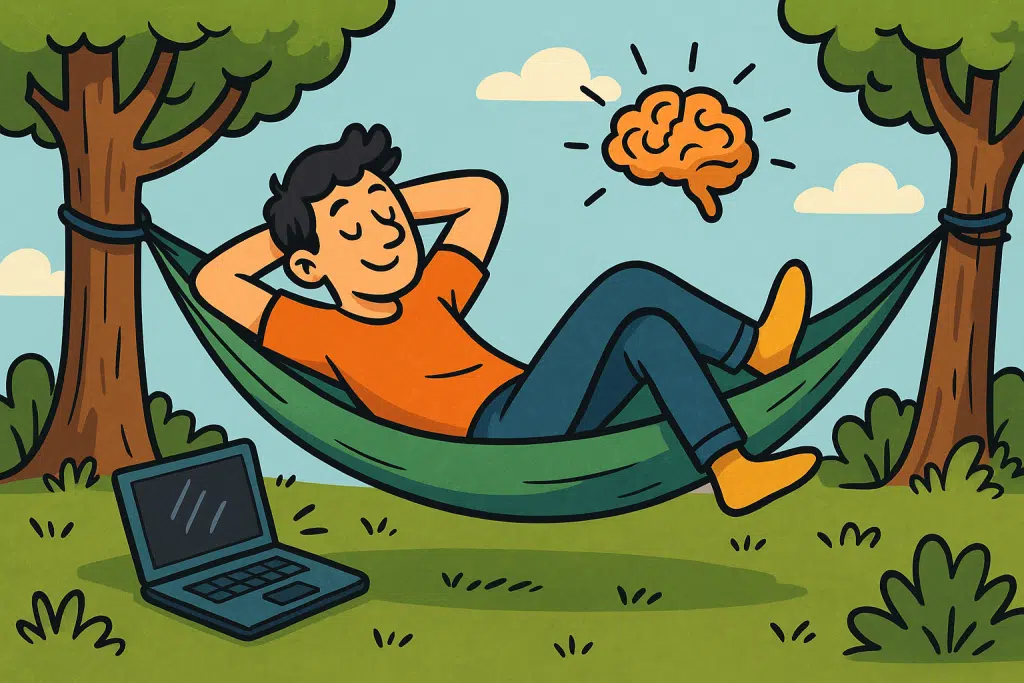The Importance of Disconnecting From Work for Mental Recharge
Charlotte Stone August 7, 2025
The lines between work and life are blurrier than ever. Remote work, hybrid offices, and the rise of hustle culture have made it normal (almost expected) to be available 24/7. According to a 2024 report by Gallup, 45% of full-time U.S. employees said they often or always feel burned out at work. And globally? The World Health Organization has officially classified burnout as an occupational phenomenon.

But here’s the thing: mental recharge isn’t a luxury. It’s a survival skill. The importance of disconnecting from work for mental recharge isn’t just about “balance.” It’s about preserving your ability to think clearly, function well, and enjoy your life. Let’s talk about why it’s crucial, how to do it effectively, and why this topic is blowing up right now.
What’s Fueling the Conversation?
1. The Digital Leash Is Getting Tighter
With Slack pings, Teams calls, and email notifications lighting up our phones, many people never truly clock out. Even vacations are often interrupted by “quick” work check-ins. A 2023 study from the American Psychological Association found that 62% of remote workers struggle to mentally switch off after hours.
2. Quiet Quitting, Loud Burnout
The rise of “quiet quitting” was the internet’s favorite buzzword in 2022, but in 2025, it’s evolved into something deeper: people are no longer interested in simply coasting. They’re asking harder questions about fulfillment, rest, and sustainability. It’s no coincidence that #mentalhealthbreak and #burnoutprevention are trending across platforms like TikTok and LinkedIn.
3. The Productivity-Recovery Loop
Research from Stanford University has shown that overwork leads to a steep drop in productivity. Working 70 hours a week doesn’t mean you get twice as much done as someone working 35. In fact, cognitive performance and emotional intelligence both drop when rest is neglected.
What Happens When You Never Disconnect?
If you think grinding non-stop is a badge of honor, let’s unpack what you’re actually doing to your brain and body:
- Cognitive Fatigue: Constant context-switching weakens memory, focus, and decision-making.
- Emotional Drain: Chronic overworking increases anxiety, irritability, and detachment.
- Physical Impact: It raises cortisol levels (your stress hormone), increasing risks of insomnia, digestive issues, and heart disease.
Over time, lack of disconnection doesn’t just affect your productivity—it can chip away at your sense of identity outside of work.
How to Disconnect From Work (Without Getting Fired)
Here’s the truth: you can set boundaries, maintain a good reputation, and still protect your peace. Here’s how:
1. Create a Work Exit Ritual
The same way you’d leave a physical office, simulate the action at home:
- Shut down your computer.
- Turn off notifications.
- Change clothes (yes, even from sweatpants to other sweatpants).
- Go for a short walk or stretch for 5 minutes.
2. Use Tech to Protect Your Peace
Instead of letting tech run your life, let it support your boundaries:
- Schedule “Do Not Disturb” time blocks on your phone and computer.
- Use email autoresponders that say, “I check emails between 9 a.m. and 5 p.m.”
- Delete or log out of work apps after hours.
3. Have a Non-Work Hobby That Makes You Lose Track of Time
Whether it’s pottery, skateboarding, gardening, or binge-reading sci-fi novels, this is about reconnecting with your self outside of your job title.
4. Normalize Saying No to After-Hours Requests
It doesn’t make you lazy—it makes you strategic. Try this:
“I’ll take a look first thing in the morning. Right now, I’m offline.”
If your workplace doesn’t respect that boundary consistently, it’s not a good culture—it’s a burnout machine.
5. Plan Micro-Breaks Daily, and Bigger Breaks Monthly
- Micro-breaks: Every 90 minutes, take 5–10 minutes to stand up, move around, or breathe deeply.
- Daily breaks: Eat lunch away from your desk. Really.
- Monthly breaks: Schedule a full day off, even if you’re not traveling.
A study published in Nature Neuroscience found that even small breaks during cognitive tasks improve performance and help the brain consolidate information.
Remote Workers, Listen Up
If you’re working from home, you’re even more vulnerable to the trap of 24/7 availability. You need extra safeguards:
- Have a separate work zone, even if it’s just a specific chair.
- Set a visible end time (e.g., light a candle when work ends).
- Use browser extensions to block work-related sites after hours.
Working from home shouldn’t mean living at work.
Leaders Need to Set the Example
If you’re a manager or team lead, your actions matter more than your Slack status.
- Don’t send emails at 10 p.m.
- Encourage time off.
- Set the expectation that “urgent” is the exception, not the rule.
The Harvard Business Review stresses that workplace leaders who model healthy disconnection directly reduce burnout rates in their teams.
The Bigger Picture: Mental Recharge = Creative Recharge
Disconnecting isn’t about laziness. It’s about capacity. Ever wonder why your best ideas come in the shower or on a walk?
When your brain is free from constant input, it has space to make creative connections. That’s not just feel-good fluff—it’s neuroscience. The “default mode network” in your brain lights up when you’re not focused on tasks, allowing creative breakthroughs and long-term planning to flourish.
That means taking intentional breaks can actually make you a better worker, not a worse one.
What Companies Are Doing Right (and Wrong)
Trend: “Right to Disconnect” Laws
Countries like France, Portugal, and Ireland have implemented policies where employees cannot be penalized for ignoring after-hours communications.
Trend: Async Work Culture
Forward-thinking companies are ditching the 9–5 and embracing asynchronous work. Tools like Notion and Loom allow teams to collaborate without being online at the same time.
Trend: The Always-On Hustle Mentality
Startups and tech companies that still idolize burnout as a badge of honor are losing talent fast. Glassdoor reviews are filled with warnings about “toxic grind culture.”
Practical Tools to Help You Disconnect
- Apps:
- Forest (for focus)
- Headspace (for guided meditation)
- Serene (for scheduling deep work and breaks)
- Physical Aids:
- Blue-light glasses to reduce screen strain
- A whiteboard or sticky note for your “shutdown checklist”
- An actual alarm clock (stop waking up to emails)
Final Thoughts: You Are Not Your Job
Let that sink in.
You are not your productivity level. You’re not your email response time. You’re not your ability to multitask on four Zoom calls. The importance of disconnecting from work for mental recharge isn’t just a productivity hack—it’s a reminder that you were a whole person before the job title.
Rest isn’t weakness. It’s wisdom.
So go ahead. Log off. Your brain will thank you.
References
- American Psychological Association. (2023). Taking time off: How breaks improve well-being and performance. APA.https://www.apa.org/
- Harvard Business Review. (2021). The Case for Taking a Break from Work.https://hbr.org/
- National Institute for Occupational Safety and Health (NIOSH). (2022). Workplace Stress and Mental Health. https://www.cdc.gov/







